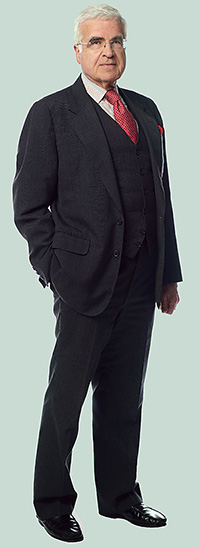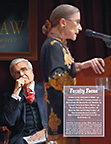Introducing Arthur R. Miller
University Professor
Printer Friendly Version
During his 36 years at Harvard Law School, Professor Arthur Miller’s intimidating teaching style made him the stuff of legend. Students caught unprepared risked being ejected from class. Or, worse still, Miller would storm out himself. The story has it that, after seeing Miller deliver a blistering dressing-down to one student, Scott Turow based hard-as-nails law professor Rudolph Perini on him in One L.
“I demanded absolute preparation and I got it,” says Miller, who also commands respect with his signature three-piece suits worn with a red tie and pocket square. “Call it a dictatorship if you will, but my belief is that you never say ‘I’m unprepared’ to a judge or a senior partner.”
NYU Law students entering Miller’s first-year Procedure class (he will also teach Complex Litigation this spring) should expect to be put on the spot. “It’s a procedure course,” he says. “It isn’t a pablum course.” But, the 73-year-old admits, “I’ve mellowed.” In the five years he’s been a visiting professor here, he hasn’t stomped out of a single classroom. He even allows students to submit a note if extenuating circumstances prevent them from studying.
Miller, an expert in civil procedure, copyright law, privacy rights and complex litigation, keeps a toehold in practice, arguing in the appellate courts as well as the Supreme Court. He has also been a ubiquitous legal commentator on television. Among practitioners and judges, however, he is best-known for his multivolume Federal Practice and Procedure, which he coauthored with Charles Alan Wright.
“He is not only a superb legal scholar, a mesmerizing legal educator, and a great lawyer, he is also among that handful of people who can explore legal topics in a public forum in a manner that is vivid and captivating, respectful of the law, and respectful of the audience,” says NYU President John Sexton, who helped recruit Miller as a “University Professor,” which allows Miller to teach both in and outside the Law School. He is developing a seminar called Dialogues on Law, Society and the Future for the NYU School of Continuing and Professional Studies.
Miller was brought up an only child in a lower-middle-class Brooklyn neighborhood by his father, Murray, a struggling solo practitioner, and mother, Mary, a legal secretary. Discouraged from following in his dad’s footsteps, he entered the University of Rochester to study metallurgical engineering. That lasted eight days. “I fell asleep in calculus and fell off my chair. I was so embarrassed, I walked out of the room and changed my major.” An aptitude test steered him toward law, so after graduating a year early, Miller entered Harvard.
Given his tough-guy reputation, it’s ironic that Miller was himself a timid, insecure law student. “I used to hide so the professors wouldn’t call on me,” he says. Six percent—11 students—in his section could expect to fail. “I used to sit there,” he says, “trying to find 11 guys dumber than me.” That summer, while working as a waiter in the Catskills, he received his first-year grades. He came in fourth in a class of 535—and was invited into the Law Review. Miller called the registrar the very next day: “I thought they made a mistake.”
The next fall, civil procedure professor Benjamin Kaplan took him under his wing. Kaplan “cared if you learned,” Miller says. “Ben instilled in me not only an affection for civil procedure and copyright, but the possibility that academics was a real life.”
Graduating magna cum laude in 1958, Miller joined Cleary, Gottlieb, Steen & Hamilton in Manhattan, where he practiced for three years before accepting an offer from Columbia Law School to become associate director of its Project on International Procedure. There, he worked closely with Kaplan, who was then a reporter for the Advisory Committee on Civil Rules of the Judicial Conference—a position Miller would later hold—and went on to teach first-year procedure alongside the Honorable Jack Weinstein, a giant in the field.
Once Miller entered the classroom, he found a strong, authoritative voice he didn’t know he had. “I wound myself up like a top because I was so petrified,” he recalls. “I over prepared. Then I sort of exploded!” Miller taught at the University of Minnesota Law School and the University of Michigan Law School before returning to his alma mater, where he became Bruce Bromley Professor of Law.
One day he was teaching “the most dull, picayune stuff imaginable,” he says, when after class two men whom he assumed were alums approached him. They were ABC executives. Miller became the first law professor to appear regularly on television, hosting Miller’s Court—the TV show that pioneered making real-life lawyering accessible to a lay audience—from 1979 through 1987. The show created media buzz, and led to a 20-year stint as Good Morning America’s legal editor. He has also hosted a weekly show on Court TV, won an Emmy in 1984 for one of three Fred Friendly seminars he moderated for PBS’s 13-part series The Constitution: That Delicate Balance, and garnered three American Bar Association Gavel Awards for promoting public understanding of the law. “TV was a wonderful experience,” he says, despite channeling his energies away from becoming a judge—an early aspiration.
Miller had been toying with the idea of coming to NYU for two decades. His TV experience confirmed he was a New Yorker at heart. And as his Harvard colleagues retired or passed away, he became closer to the NYU School of Law faculty. Miller, three times divorced with one son and two grandchildren, bought a Chelsea townhouse two years ago, which he shares with Belle, his two-year-old Welsh Terrier. “When you stop being apprehensive about being the best you can be, that’s when you retire. I’m not ready just yet.”
—
